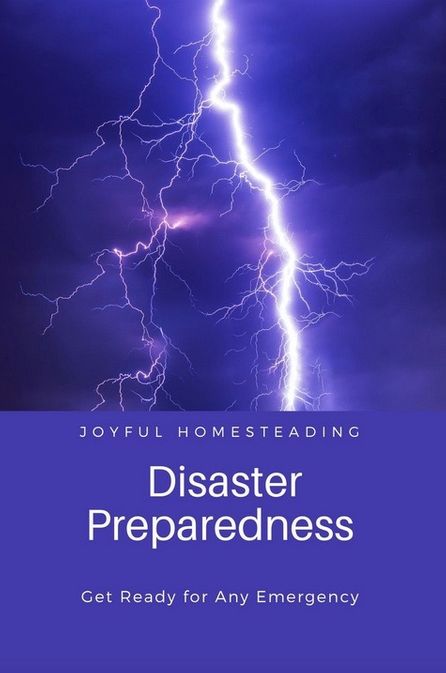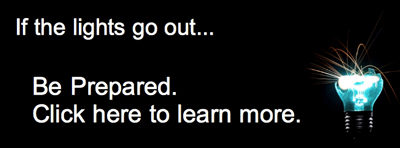Disaster Preparedness List
Being Prepared in the Face of Danger
A disaster preparedness list is not only a crucial element of self sufficient living, but also pure survival. Hurricane Katrina should have been a wake up call for every single American. Our government is simply not equipped to take care of us in the wake of a disaster, and as far as I'm concerned, they shouldn't be. That's our job.
Hurricanes, earthquakes, or what's more likely in our neck of the woods - ice storms - are natural disasters that could leave you without power for days, sometimes even weeks. If you live in the country, your well won't run without power so no power means no water. And those are just the natural disasters. Then there are potential man-made disasters as well. Rioting, terrorist attacks and the most frightening of all - an electro-magnetic pulse.

How to Prepare a
Disaster Preparedness List
It is absolutely essential that you have sufficient water, food, medicine and personal items such as toilet paper, diapers and feminine hygiene products on hand to last you for three weeks at the very least and preferably longer. Ideally, you should have enough of these items on hand to last you for at least six months.
So, Should You Go Out and Buy Everything At Once?
If disaster struck tomorrow, you'd certainly be glad you did, but let's face it; few can afford it. Instead, make up your disaster preparedness list and make it your goal to collect at least a few of these items each month. Always buy more than you need. Rotate what you have so that the older items are at the front of your shelf where you'll use them first, and the newer things are at the back.
Disaster Preparedness List:
What Should You Get First?
The average human can live without food for up to three weeks. But if we go without water for three days we will die. So obviously the first thing you must invest in is enough drinking water to last you and your family members for up to two weeks. At the very minimum, you should store one gallon per person per day or 14 gallons per family member. For our family of five, being prepared means we should always have 70 gallons of water on hand.
What Next on Your Disaster Preparedness List?
Once you have sufficient water stored, you should next start storing food. Start with bulk grains first and then move on to gathering other types of food. It seems silly to say it, but be sure to store the type of food you are used to eating. For example, if you buy a 50 pound sack of wheat, then be sure to find lots of whole grain recipes and start eating them now. That way, your family will be used to them if a disaster strikes. Even after you buy that 50 pound sack, continue to buy wheat and other food on a regular basis and rotate, rotate, rotate. An important part of being prepared is having food on hand that isn't stale. You can buy bulk wheat and other dehydrated foods for a good price at Sam's Club or online.
Fuels, Batteries and Candles
Once you have sufficient water and food on hand, you should start laying in a supply of fuel items, such as kerosene, gasoline, batteries and candles. A solar powered generator would also be a great thing to have on hand. All of these things will be crucial in being prepared should the power go out.
Personal Items
Keep at least a three month supply of toilet paper, diapers, feminine products, soap and other personal items on hand as well. It's an important part of being prepared. You never know when you will be unable to reach a grocery store, either because of financial reasons, inclement weather, or other disaster.
More Helpful Information on Being Prepared
Every home should have an Emergency Supply Kit on hand as an important part of your disaster preparedness list. Here's how to build one.
You don't want to be unprepared in an emergency, but what if disaster struck today? Here are some tips on Fast Emergency Preparation.
If you are thinking about being prepared by buying wheat in bulk, then you're likely looking for recipes. Here's a delicious, wholesome soup recipe using wheat berries.
You don't have to grind your wheat berries to be able to enjoy them. You can cook them as a cereal as well. Here's how.
Have you just bought a lot of wheat in bulk as part of your disaster preparedness list? Proper storage will ensure your wheat lasts for years. Here are some tips for storing bulk grain.
What if you haven't bought wheat yet, but want to? Where do you begin? Here are some tips on buying bulk grains.
When thinking about emergency preparation, water is the essential first item on your disaster preparedness list. Learn how to store water.
Wheat isn't just for breads, but can be used to produce a healthy vegetable as well. Learn how to grow sprouts from wheat berries and other beans.
Do you have a drilled well on your property? You can get water from your well even when the power is out. Learn about the deep well hand pump.
Dehydrated vegetables are a real winner both for being prepared for emergencies and in healthy frugal recipes, providing you with nutritional food with a long shelf-life and fantastic taste. So why use these vegetables? Read more.
Do you have a plan for having a steady supply of drinkable water on hand should the power be off for months? Most people don't like to think about it, but a little preparation now could be invaluable later on in an emergency. Learn more.
Keeping lots of wheat on hand is one of the best ways of being prepared for any kind of emergency. Learn more.
How to survive a depression. We're either in the midst of the worst depression ever, or just a recession, depending on one's perspective, but all can agree that it's always best to be prepared for whatever crisis may come. So here are four tips on how to survive any economic catastrophe.
Learning economical ways to grow and store root vegetables such as potatoes will help you survive the most difficult times. Learn how.
Stocking up on food is always a good idea, whether you're preparing for a large-scale disaster or the loss of a job. But certain foods are a cheaper and better choice for your disaster preparedness list. Learn more.
Having a good supply of food on hand, in case of either a personal disaster - such as losing a job - or a national one - such as runaway inflation or a depression - is a crucial part of your disaster preparedness list, but only if the food benefits you and your family. Learn how to choose the right food for storage.
If you or someone in your family is dependent on prescription medications for optimal health or even survival, you'll need extra ways to prepare your disaster preparedness list. Read more.
In an emergency, a good water filtration system will ensure your family will have clean drinking water even if the power goes out for an extended period of time. With a good filtration system, you can capture rain water and filter it for clean drinking water. Read this article before you purchase your system.
If you live in a city or town that fluoridates the drinking water, one of the best investments you can make for your health is a water filter that removes the fluoride. Learn why.
Can bulk wheat seed be stored in an oxygen-free container and still be planted later? Read my answer by clicking here.
Store your own grains and beans and you can make your own healthy Ezekiel bread. Learn more.
An EMP bomb detonated in the atmosphere above where you live could throw you back into the early 19th century...or worse. Learn how to prepare by clicking here.
With the uncertainty of the dollar, the best thing all of us can do is to start producing food and other goods locally. Learn how.
If you're looking for an excellent source of storable protein, you can't go wrong with Quinoa. In addition to providing a complete protein, it also provides lots of valuable minerals and is the healthiest food around. Ready for some cooking tips? Click here.
Learning to grow and then dehydrate your own food is an excellent form of preparedness. Learn which dehydrator is right for you.
Purchasing and learning how to use a firearm is crucial for self-defense these days, especially if you live out in the country. Learn how to acquire and use a gun by clicking here.
Return from Disaster Preparedness List to the Home Page











New! Comments
Have your say about what you just read! Leave me a comment in the box below.